|
The Dimopoulos Group is an international
team of scientists, that study mosquitoes wich
transmit human pathogens such as malaria
parasites and arboviruses, as part to their
career development, postdoctoral training or PhD and master
degree thesis research. |
|
|
|
|
 |
 |
George Dimopoulos,
PhD MBA, Professor, Deputy Director of the
Malaria Research Institute, Director of the
Parasitology Core Facility.
He has
worked on mosquito biology since 1991,
and pioneered in several areas and discoveries. |
|
|
|
|
 |
 |
Yuemei Dong, PhD,
Research Associate.
Yuemei is pursuing pioneering work on mosquito
immunity and mosquito-pathogen interactions
using functional genomics and transgenic
approaches. She is also developing microbe-based
mosquitocidals. |
|
|
|
|
 |
 |
Shengzhang Dong, PhD,
Research Associate.
Shengzhang is studying the Ae. aegypti
siRNA pathway and its implication in controlling
arbovirus infection using genome editing and
transgenic methodologies. He is also studying
Wolbachia-Plasmodium-Anopheles
interactions. |
|
|
|
|
 |
 |
Chinmay Tikhe, PhD,
Research Associate.
Chinmay is isolating and characterizing
bacteriophages that infect mosquito-associated
bacteria with the goal of exploring their
suitability for developing mosquito control
strategies. |
|
|
|
|
 |
 |
Caire Barreto Vieira, PhD,
Postdoctoral Fellow.
Caire is studying the
permissiveness of transgenic Anopheles
strains to different P. falciparum
field isolates, and he is also exploring the use
of a humanized mouse model to study P.
falciparum transmission. |
|
|
|
|
 |
 |
Victor Cardoso, PhD,
Postdoctoral Fellow.
Victor is studying the implication of mosquito
hemocytes in fighting infections with the human
malaria parasite and arboviruses, using a
combination of functional genomics and reverse
genetic tools. |
|
|
|
|
 |
 |
Gladys
Guiterrez Bugallo, PhD, Postdoctoral Fellow. Gladys
studies mosquito-pathogen interactions using
various genetic and infetion technologies. She
is particularly interestd in the vertical
(parent-to-offspring) transmission of
arboviruses in Ae aegypti populations. |
|
|
|
|
 |
 |
Mary Kefi, PhD,
Postdoctoral Fellow.
Mary is studying the role of Anopheles
gambiae Cryptochrome 1 as a Plasmodium
antagonist using a combination of functional
genomics techniques and infection assays, to evaluate
its potential for transmission-blocking strategies. |
|
|
|
|
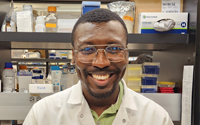 |
 |
Isaac Owusu-Frimpong, BSc, ScM program graduate
student.
Isaac is
studying the
implication of the prefoldin chaperonin complex,
and associated factors, in regulating A.
gambiae vector competence for the malaria
parasite Plasmodium. |
|
|
|
|
 |
 |
Madhavinadha Prasad
Kona, PhD,
Postdoctoral Fellow.
Prasad is developing Chromobacterium
Csp_P-based adulticidal formulations with
exceptional shelf-life and residual activity. He
is also developing field-deployable molecular
diagnostics for malria. |
|
|
|
|
 |
 |
Sally Saab, PhD,
Postdoctoral Fellow.
Sally is studying the
regulation and effector mechanisms of the
Anopheles and Aedes anti-pathogen
melanization systems using
functional genomics techniques and infection
assays, to evaluate
their potential for transmission-blocking strategies. |
|
|
|
|
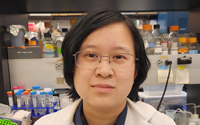 |
 |
Mabel Tao, BSc,
Research Technologist.
Mabel is working on various projects involving
Plasmodium and arbovirus infections in
mosquitoes.Mabel is also helping with a variety
of molecular and biochemical assays in the
laboratory. |
|
|
|
|
 |
 |
Vandana, PhD,
Postdoctoral Fellow.
Vandana is developing Chromobacterium Csp_P-based
larvicidal formulations with exceptional
shelf-life and residual activity. She is also
studying the bioogy of Plasmodium
gametocyte infectivity. |
|
|
|
|
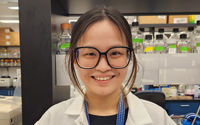 |
 |
Jenny Wang, BSc, ScM program graduate student.
Jenny is studying
novel mosquitocidal bacteria for their
suitability as microbial biopesticides. She is
determining optimal cost-effective culturing
conditions that yield high mosquitocidal
activity, along with othyer properties. |
|
|
|
|
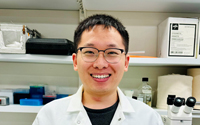 |
 |
Houhong Zhang, PhD,
Postdoctoral Fellow.
Houhong is exploring the development of novel
transgenesis strategies for malaria control that
are based on the engineering of
pathogen-inducible mosquito killing mechanisms. |
|
|
|
|
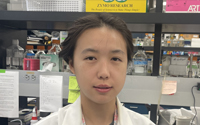 |
 |
Xinmi Zhang, PhD,
Postdoctoral Fellow.
Xinmi is
studying A. stephensi - Wolbachia
interactions and how these
influence Plasmodium infection and
mosquito vector competence. Xinmi is also
studing the influence of olfaction on the
mosquito innate immune system. |
|
|
|
|
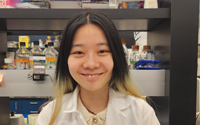 |
 |
Yuxuan Zhao, BSc, ScM program graduate student.
Yuxuan is studying the Ae. aegypti
siRNA pathway and its implication in controlling
arbovirus infection using transgenic
methodologies. She is particularly interested in
the function of the siRNA pathway factor Vago. |
|
|
|
|
|
|
|
PARASITE CORE
FACILITY |
 |
 |
Abhai Tripathi, PhD,
Research Associate Professor,
Parasitology Core Facility
co-Director.
Abhai is a malaria parasitologist and expert
in Plasmodium culturing, malaria drug
discovery, and the development of high
throughput anti-Plasmodium screening
assays. |
|
|
|
|
 |
 |
Godfree Mlambo, PhD,
Senior Research Associate,
Parasitology Core Facility
Manager.
Godfree is a malaria parasitologist and expert
on Plasmodium culturing, transgenesis,
mosquito infections, and sporozoites production
of both human and mouse malaria parasites. |
|
|
|
|
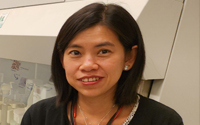 |
 |
Tassanee
Thanakornsombut, PhD,
Research Technician,
Parasitology Core Facility.
Tassanee
works on Plasmodium culturing, transgenesis,
mosquito rearing and infections, and sporozoites production
of both human and mouse malaria parasites. |
|
|
|
|
|
|
|
ALUMNI |
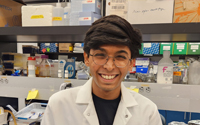 |
 |
Rohit Chebbi, BSc, Visiting Student. Rohit
studied the implication of A. gambiae
cryptochrome in regulating vector competence for
P. falciparum using various molecular
methods. He is now a postbac at the NIH/NIAID. |
|
|
|
|
 |
 |
Cristiana Cuccurullo, PhD,
Postdoctoral Fellow.
Cristiana was developing transgenic mosquitoes
that either over-express Plasmodium-targeting
nanobodies, or lack parasite host factors that
protect it against melanization, to evaluate
transmission-blocking strategies. |
|
|
|
|
 |
 |
Mihra Tavadia, ScM, Research Technologist.
Mihra was studying the
Ae aegypti Vago gene, and how it may
connect the RNAi pathway with other immune
pathways using transgenesis. She is currently
pursuing PhD graduate studies at the University
of Montpellier. |
|
|
|
|
 |
 |
Tanaya Sheth, BSc, ScM program graduate student.
Tanaya
investigated the implication of
Wolbachia-induced Anopheles genes in anti-Plasmodium
defenses. She is now a research technician at
Columbia University, NY. |
|
|
|
|
 |
 |
Mahdiyeh Bigham, PhD,
Postdoctoral Fellow.
Mahdiyeh was developing PCR-based molecular
diagnostic assays for Anopheles
mosquito insecticide resistance surveillance. She is
She is now a Staff Scientist at Washington
University, St. Louis. |
|
|
|
|
 |
 |
Johnny Nakhleh,
PhD, Postdoctoral Fellow.
Johnny was studying the Anopheles
complement-like system and C-type lectin 4 that
regulate lysis and melanization of
Plasmodium, and he exploring the potential
of these defense systems to
develop malaria resistant mosquitoes. |
|
|
|
|
 |
 |
Alexandros
Belavilas, BSc, Fulbright Scholar/Visiting Fellow. Alexandros
studied the implication of mosquito long
non-coding RNAs (lncRNA) in regulating pathogen
infection and reproduction. He completed PhD graduate training
at the University of Thessaly, Greece. |
|
|
|
|
 |
 |
Amanda Maldonado, BSc,
Technician.
Amanda trained on various laboratory
techniques in the areas of molecular entomology
and biology. She collaborated on a project
aiming at the development of bacteria-based
mosquitocidals. |
|
|
|
|
 |
 |
Maria Luisa Simoes,
PhD, Research Associate.
Maria Luisa studied the c-type lectins that
regulate melanization of
Plasmodium. She is an Assistant Professor
at the London School of Hygiene and Tropical
Medicine, UK. |
|
|
|
|
 |
 |
Cecilia
Springer Engdahl, PhD, Postdoctoral Fellow.
Cecilia is continuing her studies on the Chromobacterium
mosquitocidal and other microbe-derive
biopesticide candidates at Umea University,
Sweden as part of her fellowship. |
|
|
|
|
 |
 |
Anastasia Accoti, PhD, Postdoctoral Fellow.
Anastasia discovered
and characterized novel entomopathogenic fungi
that can be developed into mosquito control
tools, and has return to Italy to continue her
studies on vector biology. |
|
|
|
|
 |
 |
Eric Caragata, PhD,
Research Associate.
Eric studied Chromobacterium
mosquitocidal activity towards developing
field-compatible formulations for mosquito control.
He is an Assistant Professor at the University
of Florida, Department of Entomology and
Nematology. |
|
|
|
|
 |
 |
Natalie Rutkowski, BSc, Post-Bac
student. Natalie
developed a field-deployable molecular
diagnostic platform for detection of arboviruses
in mosquitoes. She is pursuing a PhD at the
Johns Hopkins School or Medicine. |
|
|
|
|
 |
 |
Sayali Mulay, ScM, Biotechnology ScM program graduate
student. Sayali developed liquid culture fermentation
methods for large scale production of
Chromobacterium Csp_P. She is pursuing a
PhD at the University of Tennessee. |
|
|
|
|
 |
 |
Hannah MacLeod, BSc, pre-doctoral graduate
student.
Hannah studied the interactions between
Culex mosquitoes and Zika virus. She is
pursuing postdoctoral training at the USDA-ARS /
Cornell University. |
|
|
|
|
 |
 |
Aliyah Silver, BSc, pre-doctoral graduate
student.
Aliyah was working on
developing
RNAi pathway enhanced transgenic Aedes
with a special focus on the salivary gland. The
long-term goal of this project is to assess the utility of RNA
pathway engineering for arbovirus control. |
|
|
|
|
 |
 |
Abigail Conte, summer intern. Abby
worked with Hannah on the characterization
of the Culex-Zika virus
interactions, with the goal of understanding the
mechanism of refractoriness and why Culex
mosquitoes are non-vectors for Zika virus. |
|
|
|
|
 |
 |
Tiffany Pan, BSc, ScM program graduate
student.
Ty worked on the
isolation and characterization of bacteriophages
from the mosquito microbiota. She also
investigated whether bacteriophages could be
used to modulate the microbiota of the larval
breeding water. |
|
|
|
|
 |
 |
Raul Saraiva, MS, pre-doctoral
graduate student.
Raul
characterized bacteria-produced anti-Plasmodium
and anti-dengue virus factors, and studied
the implication of
Anopheles immune
pathways in the defense against
P. vivax
infection. |
|
|
|
|
 |
 |
Nahid Borhani Dizaji,
PhD, Postdoctoral Fellow. Nahid
studied the fitness cost/gain of
immune-transgenesis, with a special focus on how
recombinant Rel2 over-expression may influence
the microbiota of reproductive organs, and how
this may affect mating behavior. |
|
|
|
|
 |
 |
Purnima Ravisankar, BSc, ScM program graduate
student.
Purnima studied bacteria-produced antimicrobial
factors, and the implication of candidate
Plasmodium host factors in regulating
infection in A. gambiae. |
|
|
|
|
 |
 |
Yesseinia Anglero-Rodriguez, PhD, Postdoctoral
Fellow.
Yesseinia studied
Aedes
- dengue virus
interactions with an emphasis on virus host
factors, and how the mosquito mycobiome can
influence susceptibility to virus infection. She
also studied mosquito immune activator
compounds. |
|
|
|
|
 |
 |
Sarah Short, PhD, Postdoctoral Fellow.
Sarah studied the
Aedes
microbiota with a
focus on mosquito genes/systems that can
influence the microbial load of the intestine.
She is an Assistant Professor at Ohio State
University. |
|
|
|
|
 |
 |
Jenny Carlson,
PhD, Postdoctoral Fellow. Jenny studied the Anopheles microbiota
and how microbial exposure of larval stages may
influence immune competence of adults. She is
also studied the mosquitocidal activity of
Chromobacterium Csp_P. |
|
|
|
|
 |
 |
Seokyoung Kang, PhD, Postdoctoral Fellow.
Seokyoung studied mosquito - pathogen
interactions with an emphasis on host
factors that can be used to attenuate pathogen
infection using small molecule inhibitors or
dsRNAs. He also studied a novel
Plasmodium
host factor. |
|
|
|
|
 |
 |
Celia Demby, BSc, pre-doctoral graduate student.
Celia characterized the JAK-STAT pathway
regulated dengue virus restriction factors to
elucidate mosquito antiviral defenses. She was
also studying the influence of
mosquito-associated fungi on the susceptibility
to the dengue virus. |
|
|
|
|
 |
 |
Natapong Jupatanakul (Tui), MS, pre-doctoral
graduate student.
Tui elucidated
the role of novel immune factors in anti-dengue
virus response. He studied the use of
transgenesis to develop dengue virus resistant
mosquitoes. He is a researcher in Thailand. |
|
|
|
|
 |
 |
Jingru Fang (Katie),
BSc, ScM program graduate student.
Katie used
biochemical and molecular methods to define the
nature of bacteria-produced metabolites that
have anti-pathogen activity.
She pursued her PhD
graduate training at
Scripps. |
|
|
|
|
 |
 |
Sarah Van Tol, BSc, ScM program
graduate student.
Sarah is
investigated whether malaria and dengue
transmission-blocking bacteria of the mosquito
intestine can be vertically and transstadially
transmitted. She pursued her PhD graduate
training at
UTMB. |
|
|
|
|
 |
 |
Benjarat Phatta (Ja),
BSc.
Ja is a graduate
(PhD) student at Chiangmai University, and was
studying the Aedes aegypti microbiota
and how it may influence vector competence for
dengue. She tested several bacterial
isolates for influence on dengue infection in
cells and mosquitoes. |
|
|
|
|
 |
 |
Gabriela Bassi Maia, Visiting Fellow.
Gabriela
was a Biomedical Sciences student from Sao Camilo
University Center in Sao Paulo, and trained on various aspects of molecular entomology
through the Brazilian Scientific Mobility
Program. |
|
|
|
|
 |
 |
Ligia Correia Lima de Souza, Visiting Fellow.
Ligia
was a medical student from the Federal
University of Bahia, and trained on various aspects of
molecular biology and entomology through the
Brazilian Scientific Mobility Program. |
|
|
|
|
 |
 |
Benjamin Blumberg, PhD, PhD, Pre-doctoral
graduate student.
Ben characterized genes involved in
bacteria-independent anti-Plasmodium
defenses. He also studied
Penicillium
fungi that rendered the mosquito more
susceptible to infection. He pursued PD
training at JHSPH. |
|
|
|
|
 |
 |
Andrew Pike, PhD, PhD, pre-doctoral
graduate student.
Pike characterized
the A. stephensi
IMD pathway-regulated
transcriptome and proteome, and studied
the fitness cost/gain of immune-transgenesis. He
pursued PD trainingat the University of
Maryland. |
|
|
|
|
 |
 |
Octavio Augusto Talyuli da Cunha, BSc,
Visiting Fellow.
Octavio trained in various molecular techniques
and infection assays. He studied the influence
of a yeast on mosquito resistance to
Plasmodium.
He pursued PhD graduate training at the Fed Uni
Rio De Janeiro. |
|
|
|
|
 |
 |
Nathan Dennison, PhD, Postdoctoral Fellow.
Nathan performed
pioneering studies of
Anopheles micro-RNA
responses to
Plasmodium infection, and linked
micro-RNAs with the regulation of
anti-Plasmodium defense. He
pursued training at
Imperial College London. |
|
|
|
|
 |
 |
Chontida Tangsongcharoen (Koi), BSc,
Visiting Fellow.
Koi studied bacteria-produced larvicidal factors
that specifically inhibit
Culex larvae.
She studied the mosquito transcriptome responses
to exposure to these factors, to understand the
mechanism of action. |
|
|
|
|
 |
 |
Simone Sandiford, PhD, Postdoctoral Fellow.
Simone identified
several interacting protein partners of mosquito
immune pattern recognition receptors using a Y2H
screen. She also studied the role of a mosquito
actin as an extracellular immune factor. |
|
|
|
|
 |
 |
Yang Chen, PhD, Postdoctoral Fellow.
Yang worked on novel
mosquito immune-regulators and developed
transgenic
Anopheles mosquitoes that
over-express PGRP-LC and Caspar-dsRNA, resulting
in Plasmodium resistance. Hepursued
traing in programming. |
|
|
|
|
 |
 |
George (Ned) Barringer, ScM program graduate
student.
Ned
studied a mosquito gut-associated yeast that
influences the mosquito's susceptibility to
Plasmodium infection. The mechanism of
parasite inhibition is still unknown and
subject to further studies. |
|
|
|
|
 |
 |
Alicia Majeau, ScM program graduate student.
Alicia
screened and identified bacteria that could
influence mosquito attractiveness, presumably
through olfactory cues. Such bacteria could be
used to enhance mosquito attraction to
bacteria-spiked sugar baits. |
|
|
|
|
 |
 |
Alicia Shields, PhD, Postdoctoral Fellow.
Alicia studied the
implication of dengue virus host factors in
regulating susceptibility to the virus. She also
studied the influence of a
Penicillium
fungus on mosquito susceptibility to dengue
virus infection. |
|
|
|
|
 |
 |
Omar BenMarzouk, PhD, Postdoctoral Fellow.
Omar studied mosquito
microbiota and initiated a project that
discovered
Anopheles micro-RNAs that
were implicated in regulating mosquito
susceptibility to
Plasmodium. He
pursued
PD training in Sevilla. |
|
|
|
|
 |
 |
Ana Bahia, PhD, Postdoctoral Fellow.
Ana identified a
Serratia bacterium that exerts both
entomopathogenic and anti-Plasmodium
activities. She also collaborated on several
other projects. She is an Assistant Professor at the
Federal University of Rio de Janeiro. |
|
|
|
|
 |
 |
Alekhya Valdahami, ScM program graduate student.
Alekhya
studied the implication of several serine
proteases and serpins in
A. stephensi
immunity to
P. falciparum and bacterial
infection. She also studied the mosquito IMD
pathway-regulated transcriptome. |
| |
|
|
 |
 |
April Clayton, PhD, pre-doctoral
graduate student.
April characterized
the Anopheles Caudal gene, and showed
that it was implicated in regulating
susceptibility to
P. falciparum
infection and the intestinal microbiota. She
pursued PD training at the NIH. |
| |
|
|
 |
 |
Ramesh Chandra, PhD, Postdoctoral Fellow.
Ramesh developed a
mosquito cell line with an immune-inducible
luciferase marker. He also identified AgDSCAM
splicing factors that were regulated by the
immune system. He pursued PD training at the University of
Maryland. |
| |
|
|
 |
 |
Shuzhen Sim, PhD, pre-doctoral
graduate student.
Shuzhen showed that dengue virus infection
suppresses mosquito immunity and influences host
seeking behavior. She also studied field
population variations in vector competence. She
pursued PD training at the Genome Institute of Singapore. |
| |
|
|
 |
 |
Jose
Luis Ramirez, PhD, pre-doctoral
graduate student.
Jose Luis performed the first field-based
Aedes microbiota studies and discovered a
Chromobacterium that mediate
entomopathogenic and anti-pathogen activities.
He is a PI at the USDA. |
| |
|
|
 |
 |
Chris Cirimotich, PhD, Postdoctoral Fellow.
Chris performed
pioneering work that for the first time showed
that a bacterium can directly inhibit
Plasmodium development in the mosquito gut.
He is an Intelligence Analyst at Battelle. |
| |
|
|
 |
 |
Jayme Souza-Neto, PhD, Postdoctoral Fellow.
Jayme established the
implication of the
Aedes aegypti
JAK-STAT pathway in anti-dengue defense, and
also collaborated on a variety of other
projects. He is an Asistant Professor at Sao Paulo State University. |
| |
|
|
 |
 |
Sushismita Das, PhD, Postdoctoral Fellow.
Smita studied the imfluence of photic
stimulation on the mosquito circadian rhythm and
feeding behavior, and participated in the
generation of transgenic mosquitoes. She is an
Assistant professor at the Taradevi Jain
College. |
| |
|
|
 |
 |
Fabio Manfredini, PhD, Visiting Fellow. Fabio
studied the mosquito microbiota, looking at
variations in microbial load and species
composition between individuals, and generations
of, mosquitoes. He pursued PhD graduate training
at the University of Siena. |
| |
|
|
 |
 |
Zhiyong Xi, PhD, Postdoctoral Fellow.
Zhiyong introduced
the dengue virus infection model to Dimopoulos
Group and performed pioneering work on mosquito
immune pathway implication in anti-dengue
defense. He is a Professor at the
Michigan State University. |
| |
|
|
 |
 |
Lindsey Garver, PhD, pre-doctoral
graduate student.
Lindsey performed
pioneering work on the IMD
pathway, showing that is was implicated in the
defense against
P. falciparum
infection. She pursued PD training at the NIH. |
| |
|
|
 |
 |
Emma Warr, PhD, Postdoctoral Fellow.
Emma characterized
the Anopheles midgut transcriptome, studied the
GNBP gene family and the implication of
anti-Plasmodium immune factors in melanization.
She continued as a Research Assistant at Keele University. |
| |
|
|
 |
 |
Ruth Aguilar, PhD, Postdoctoral Fellow.
Ruth performed field
studies of mosquito immunity in Cameroon. She
also studied the selective pressure of
Plasmodium infection on the
Anopheles
transcriptome. She is a Staff Scientist at the
Barcelona Center for International Health
Research. |
| |
|
|
 |
 |
Harry Taylor, PhD, Postdoctoral Fellow.
Harry initiated the
characterization of the Anopheles Down Syndrome
Cell Adhesion Molecule (AgDSCAM) hypervariable
pattern recognition receptor. He is a
Research Assistant Professor at Northwestern
University. |
| |
|
|
 |
 |
Makeda Robinson, MD, undergraduate trainee.
Makeda was involved
in a variety of projects that focused on
molecular aspects of the
Anopheles
innate immune system. She pursued an MD. |
| |
|
|
 |
 |
Antonio Mendes, PhD, Visiting Fellow. Antonio's
project focused on the the
Anopheles gambiae
salivary gland transcriptome, using
microarray-based data. He pursued a PhD at
Imperial College London. |
| |
|
|
 |
 |
Vassiliki Mahairaki, PhD, Postdoctoral
Fellow.
Vassiliki studied the Plasmodium parasite's
interaction with the mosquito midgut. She
continued with a postdoctoral training at the
Johns Hopkins School of Medicine. |
| |
|
|














































































































